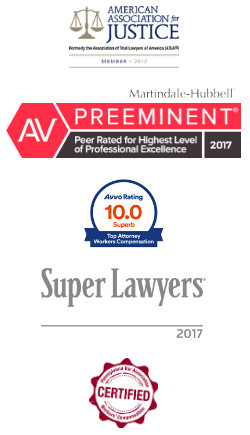After 35 years of helping Pennsylvania workers with the sometimes complex and misunderstood compensation program, attorney Gregory Boles has seen many of the same questions pop up again and again. In order to help you understand how the whole thing works so you feel more comfortable during the process, take some time to explore these frequently asked questions and their answers on this website. One of our top goals is to give you peace of mind so you can concentrate on recovery.
While these questions and answers provide a lot of important information about the Pennsylvania Workers Compensation Act and the filing process, we are always available to help you with your particular claim. Call to schedule an initial consultation appointment as soon as possible after the accident occurs.
Workers Compensation Insurance Defined
The Pennsylvania Workers Compensation Act regulates the payment of benefits from a specific type of disability insurance funds provided by employers to every worker. They are paid out to cover medical expenses and lost wages for individuals who are injured or made ill due to their job. The only people who are not eligible for these benefits are federal employees, some agricultural and domestic workers, and independent contractors.
Q. I was injured on the job. How do I get workers’ compensation benefits?
A. After sustaining an injury at work, you must notify your employer of the injury. If possible, it’s best to give your employer a written notice. Although the law allows a certain amount of days to notify your employer, you should tell your employer within 21 days of the injury occurring. Once your injury is reported, your employer should file a work comp claim. Your employer and their insurance carrier have 21 days to accept, deny, delay or modify your claim.
Q. If my claim is accepted, what types of benefits will I be awarded?
A. If your claim is accepted initially, you may be awarded compensation for medical costs (doctor visits, surgery, medicine), disfigurement, pre-injury average weekly wage, total or partial disability, and medical-related travel expenses. Family members who tragically lost a loved one in a workplace accident, may be awarded compensation for the expenses related to a tragic death.
Q. Can’t I just file a lawsuit against my employer?
A. Per state law, you are not allowed to sue your employer for a work-related injury. The state’s workers’ compensation system is the only way you can receive compensation from your employer. If someone other than your employer caused or contributed to the injury occurring, you may be able to file a lawsuit in the civil court system.
Q. I was working for two employers at the time of my injury. Does that affect my claim?
A. Yes, your employment with two companies may affect the amount of benefits you receive. It’s imperative you tell a skilled work injury attorney right away of your employment status. They may be able to get you more weekly compensation as a result of missing time at both jobs.
Q. Can my employer fire me for filing a work comp claim or hiring a lawyer?
A. No. Your employer can’t fire you for filing a workers’ compensation claim. And, the law prohibits your employer from retaliating against you for hiring a work comp attorney. If you were fired or retaliated against after filing a work comp claim or hiring a lawyer, you should discuss your situation with a dedicated work injury lawyer immediately.
Q. I was injured on the job in another state. Can I file a workers’ compensation claim in Pennsylvania?
A. If you were injured at work in another state, you may be able to file a work comp claim in Philadelphia, Pennsylvania. When injured in another state, it would be wise to get experienced legal help. A knowledgeable work comp attorney with experience handling cases of this nature will carefully navigate the claims process to ensure you get the highest amount of compensation possible.
Q. If I hire a work comp lawyer, how will I benefit?
A. Sadly, employers and insurance companies do not always have your best interest at heart and oftentimes, are only thinking of their bottom line – saving money. A caring work injury attorney will look out for you and use every resource he or she has to protect your legal right to full and fair benefits. In addition to securing you the best possible case outcome, an ethical work injury lawyer will:
- Handle negotiations with the insurance company
- Prepare and turn in claim paperwork
- Keep you informed of any major claim changes
- Make sure you get the best medical care available
- Relieve you of the stress and strain associated with the work comp system
Q. Are work injury attorneys expensive?
A. At Liberty Bell Workers Compensation, our aggressive work injury lawyer on staff represents all cases on a contingency fee basis. Simply put, you won’t have to pay a dime until your case is won. Call 215.399.0089 right away to arrange a time to speak one on one with a compassionate work injury staff member at Liberty Bell Workers Compensation.
Q. Out of work and money’s tight. Can I still hire legal help?
A. Absolutely. You do not have to pay any upfront money to hire an experienced and knowledgeable attorney like Gregory Boles who specializes in PA workers compensation. Instead, they make a contingency fee, which is a percentage of the total benefit amount paid to their client. In Pennsylvania, this amount is capped at 20 percent. If you do not receive workers comp benefits after the entire court process finishes, you do not pay anything.
Q. How long after the injury can I file for workers compensation?
A. Various specific deadlines exist for filing a workers compensation claim. Ideally, you should file as soon as possible after the accident or other issue occurs. In general, you or your attorney have 120 days to file if you do not want to risk an automatic denial of benefits.
Q. Will my health benefits still exist if I file a claim?
A. Yes. Any health benefits provided to you by your employer have no relationship to workers compensation benefits at all. You are always allowed to visit your regular physician and pay for the treatment that is not covered by existing health insurance. It is those charges that may be covered by the workers comp payouts after the fact. Any additional questions about how health insurance changes if you are off work, for example, is employer-specific and has nothing to do with Pennsylvania rules.
Q. Do I have to use the doctor my employer recommends?
A. If your employer’s workers compensation insurance policyholder maintains a list of approved healthcare providers, you must see one of them within 90 days of getting hurt or ill at work. If they do not have this list, you are free to see whatever doctor you prefer. Also, you can make an appointment with your preferred doctor after seeing a company-approved doctor. If you have any questions about this requirement, bring it up with your attorney so they can investigate the specific rules pertaining to your place of employment.
Q. I was working, but not at the usual job site. Can I still get benefits?
A. Yes. If you were performing duties for your employer, it does not matter where you were when you were injured. Even if you were in another state at the time, Pennsylvania workers compensation rules still cover you.
Q. The injury was my fault. Is workers compensation still possible?
A. The entire workers compensation system exists as a type of no-fault insurance that does not investigate who caused the accident or incident that resulted in an injury or illness. If a third party was responsible in any way, a qualified attorney can investigate the matter and see if there are grounds for a lawsuit.
Q. Does workers compensation affect my pension in any way?
A. Possibly. How workers compensation benefits will affect your pension or retirement payments depend on rules put forth by your employer specifically. Get help from your attorney to figure out the best way forward.
Q. How much money am I going to get?
A. There is no simple way to answer this question. The total amounts of workers comp benefits or settlements have to do with how expensive your medical treatment and ongoing care is and how much you earned prior to the health problem. In general, compensation for lost wages is approximately two thirds of your income.
Q. When will the benefit payments stop?
A. This is another question that cannot be answered specifically unless you speak about your particular case with an attorney. Pennsylvania rules do not specify a time limit or end date for benefits. For a simple injury with a quick recovery time, you may get compensation for less than a month. For a more serious problem, the workers comp benefits may last forever. Determinations involve a diverse range of information specific to your case.
Q. How does the payment process work?
A. In Pennsylvania, most workers compensation payments are direct deposited into a bank account every other week just like a paycheck would normally be. You can also opt for a paper check. Another option is the ReliaCard, which is a US bank debit card that allows you to make payments and access money through ATMs or in shops. How you specifically get your money will depend on the particular ruling in your case, how your employer’s insurance company handles payments, and your preferences.
Q. Will I have to pay taxes on workers comp benefits?
A. No. Pennsylvania workers comp payments are not eligible for taxation.
Q. Will I get additional benefits beyond workers compensation?
A. It is possible that you get financial benefits beyond a workers compensation settlement. For example, temporary or permanent disability may entitle you to Social Security benefits from the federal government. In order to determine your eligibility for maximum payouts, discuss all of the options and possibilities with your workers comp attorney.
Q. How does permanent disability differ from temporary disability?
A. As the names of these two different types of disability designations imply, what is permanent and lasts forever, and the other is temporary, which means you can recover from the disability and returned to work as expected. Healthcare provider reports and the workers compensation specialists for the state work together to determine which one is more appropriate for your case.
If you experience an accident or illness so severe that you can never return to work again, you will be eligible for permanent disability payments. You will receive two thirds of your current income with no increases for cost-of-living forever. In most cases, the permanent disability status requires an update at 104 weeks after the initial claim.
At that time, you receive what is called an impairment rating, which indicates whether you can return to work or not. If you score a 50 percent or below, you maintain your permanent total disability status. If you get above 50 percent impairment rating, you may be switched to permanent partial disability benefits. This gives you less money every month because you should be able to get part-time employment or less strenuous employment than your previous job to make up the difference.
Temporary disability benefits also provide two thirds of your weekly income, but they do not last forever. You can get these payments for a maximum of 104 weeks. The same checks and impairment ratings for permanent disability also exist.
Q. What is an impairment rating?
A. As outlined above, and impairment rating is a score that you are given by medical professionals to determine your rate of disability. Any injury or illness that occurs during or is caused by work requires one or more evaluations to determine how impaired you are. The 50 percent impairment rating threshold determines whether you are totally or partially disabled and whether you can return to work or not.
Q. Can I get workers compensation for occupational diseases?
A. The Pennsylvania Workers Compensation Act includes occupational diseases and illnesses as part of the benefits allowance. These issues include things like exposure to toxic chemicals or radiation. In order for the illness to qualify you for benefits, it must develop within 300 days of last exposure at the job.
Q. Is a settlement right for me?
A. The ability to receive a lump sum settlement payment for workers compensation cases only appeared in Pennsylvania in 1996. These are called Compromise and Release settlements. Deciding whether taking one of these or not is the right decision for you depends on a wide variety of factors. Is the settlement enough to compensate you for the injury or illness? Does it fairly replace the lost wages? The best way to determine the right answer is to discuss your particular case with an attorney who understands the details.
A Compromise and Release settlement is the final payment for workers comp from an employer to the employee. While there are some that allow for ongoing medical expenses to be paid, there are no other payments for lost wages.
It is important to note that these settlements are frequently offered by the insurance company shortly after an accident to a troubled employee who has not yet retained the services of an attorney. The large sum of money may seem quite attractive at first, but it is not always best option going forward. Remember that insurance companies want to save money, and discuss other options with your attorney first before agreeing or signing any paperwork.
Q. Do I really need a lawyer to help with this?
A. Yes. Under Pennsylvania law, you are allowed to file your own workers compensation claim, represent yourself, and handle all the paperwork and communication for your own case. However, when you have been injured or became ill on the job, the last thing you should worry about is paperwork and dealing with governmental regulations. This is a time for you to concentrate on getting better and handling the high amounts of stress.
The simple fact of the matter is that people who handle their own workers compensation claims frequently end up with denials or smaller settlements than they truly deserve. As workers comp lawyers work on a contingency fee basis, which means they do not get paid unless you do, hiring one makes sense for absolutely everyone.
Attorney Gregory Boles with the Liberty Bell Workers Compensation firm is ready to assist you with any part of the claims process. Whether you were just injured or have already received an initial denial, contact the office today to set up a consultation.







